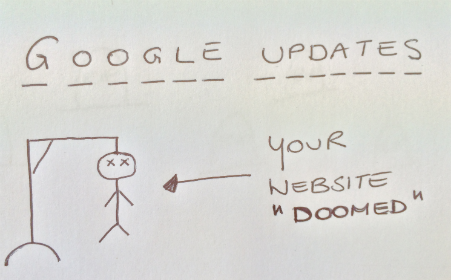When you’re an affiliate marketer – either small or large – your income depends on cookies. Since practically its inception, affiliate marketing has relied on cookies to track leads, assign commissions and more.
So, when Google – with its 65% (ish) market share – announced that the Chrome browser would no longer track third-party cookies, many affiliates panicked. Would Google’s new cookies policy be the death of affiliate marketing? How could we track what we needed without cookies?
First, Let’s Get Some Perspective About Google’s Third-Party Cookies Policy
Since 2013, Firefox and Safari (Apple) browsers have been blocking third-party cookies. While they have significantly lower user bases than Chrome it goes to show that this is really nothing new.
When Will Google’s Cookies Policy Change and Why?
At last look, a specific date has not been provided by Google. The company has only said it would be “late 2023.” It’s all about privacy. People are tired of having their every moves tracked online and cookies are the primary way that is done.
Because Google is working toward a goal of heavy user privacy it is phasing out third-party cookies in an effort to make that happen.
She continues with a good example. A website owner might allow a Facebook cookie (tracking pixel) on their site when they run Facebook ads. That website owner is allowing Facebook to keep track of what you are doing on their site, where you are browsing, what pages you visit. But that’s Facebook’s cookie. It’s not the website owner’s cookie, so it’s considered third-party. In addition, it’s a cookie designed to track your movements… another criteria required to be called a third-party cookie.
Have you ever gone to a website (or multiple sites) and started seeing ads all over for the same gardening gloves you were just shopping for, but didn’t buy? That’s third-party cookies at work. They are on multiple sites and are tracking you as you move from one place to another.
Google, Apple and other companies think this is an invasion of your privacy and want to put an end to it.
/* .tcb-flex-col{padding-left:0px;}[data-css=”tve-u-36600f2c2fae65f”]{width:217px;float:none;margin:0px auto !important;padding-right:0px !important;padding-top:25px !important;padding-left:10px !important;}[data-css=”tve-u-1600f2c2fae63b”]{padding:20px 20px 0px !important;margin-bottom:20px !important;}[data-css=”tve-u-13600f2c2fae647″]{–tcb-applied-color:rgb(20,115,210)!important;}:not(#tve) [data-css=”tve-u-9600f2c2fae643″]{–g-regular-weight:400;–g-bold-weight:700;color:rgb(20,115,210) !important;–tcb-applied-color:rgb(20,115,210)!important;–tve-applied-color:rgb(20,115,210)!important;font-family:Raleway !important;font-weight:var(–g-regular-weight,normal)!important;font-size:28px !important;}[data-css=”tve-u-11600f2c2fae645″]{–tcb-applied-color:rgb(20,115,210)!important;}[data-css=”tve-u-12600f2c2fae646″]{–tcb-applied-color:rgb(20,115,210)!important;}:not(#tve) [data-css=”tve-u-9600f2c2fae643″] strong{font-weight:700 !important;}:not(#tve) [data-css=”tve-u-14600f2c2fae648″]{–g-regular-weight:400;–g-bold-weight:700;color:rgb(127,163,194) !important;–tcb-applied-color:rgb(127,163,194)!important;–tve-applied-color:rgb(127,163,194)!important;font-family:Raleway !important;font-weight:var(–g-regular-weight,normal)!important;font-size:8px !important;}:not(#tve) [data-css=”tve-u-14600f2c2fae648″] strong{font-weight:700 !important;}:not(#tve) [data-css=”tve-u-18600f2c2fae64d”]{–g-regular-weight:400;–g-bold-weight:700;font-size:16px !important;font-family:Raleway !important;font-weight:var(–g-regular-weight,normal)!important;}:not(#tve) [data-css=”tve-u-21600f2c2fae650″]{–g-regular-weight:400;–g-bold-weight:700;font-size:16px !important;font-family:Raleway !important;font-weight:var(–g-regular-weight,normal)!important;}[data-css=”tve-u-18600f2c2fae64d”] strong{font-weight:700 !important;}[data-css=”tve-u-21600f2c2fae650″] strong{font-weight:700 !important;}[data-css=”tve-u-17600f2c2fae64c”]{margin-top:0px !important;padding-bottom:0px !important;margin-bottom:0px !important;padding-top:0px !important;}[data-css=”tve-u-28600f2c2fae657″]{padding:5px 0px 10px !important;background-image:none !important;}:not(#tve) [data-css=”tve-u-29600f2c2fae658″]{–g-regular-weight:400;–g-bold-weight:700;font-family:Raleway !important;font-weight:var(–g-regular-weight,normal)!important;}:not(#tve) [data-css=”tve-u-29600f2c2fae658″] strong{font-weight:700 !important;}:not(#tve) [data-css=”tve-u-15600f2c2fae64a”] strong{font-weight:700 !important;}:not(#tve) [data-css=”tve-u-38600f2c2fae661″] strong{font-weight:700 !important;}[data-css=”tve-u-17942f5f22d”]{margin-top:0px !important;margin-bottom:0px !important;}}@media (max-width:767px){[data-css=”tve-u-35600f2c2fae65e”]{text-align:center;background-image:none !important;}[data-css=”tve-u-0600f2c2fae638″]{background-image:none !important;}[data-css=”tve-u-2600f2c2fae63c”]{background-image:none !important;}[data-css=”tve-u-5600f2c2fae63f”]{padding-top:0px !important;}[data-css=”tve-u-4600f2c2fae63e”]{background-image:none !important;margin-bottom:0px !important;}[data-css=”tve-u-7600f2c2fae641″]{background-image:none !important;}[data-css=”tve-u-1600f2c2fae63b”]{padding-bottom:20px !important;margin-bottom:0px !important;padding-left:10px !important;padding-right:10px !important;}[data-css=”tve-u-8600f2c2fae642″]{padding:10px 0px !important;background-image:none !important;}[data-css=”tve-u-36600f2c2fae65f”]{width:120px;margin-left:auto !important;margin-right:auto !important;margin-bottom:10px !important;}[data-css=”tve-u-28600f2c2fae657″]{padding:10px 0px !important;background-image:none !important;}}
/*]]>*/
/**/
How To Make More Affiliate Sales Without Selling
Wish you could:
Discover the exact process I follow to make thousands every month using freebies.

I understand that I will also receive weekly articles & videos plus periodic discounts, product notices & more. I can unsubscribe at any time.
On the other hand, a first-party cookie doesn’t track you or your behaviors anywhere and doesn’t share personal information. This is a cookie your site places in the user’s browser. It might help pages load faster if the visitor returns or keep items in their shopping cart for later on, etc.
Or the cookie could be an affiliate text link that sends a lead or customer to another site where – on THAT site – a unique affiliate code is created or recognized that allows leads and sales to be accounted for.
First-party types of cookies aren’t going away. Google isn’t targeting them. Almost all affiliate text links are first party, so those are safe.
However, affiliate network links (ad networks, etc.) are in danger. Those do have tracking capabilities and can span multiple sites.
Does Google’s Cookies Policy Impact Email?
Because email uses pixel tracking (which is not the same as cookies), Google’s nor Apple’s policies should affect email tracking.
What Will Google Replace Third-Party Cookies With?
Google is working on something called Topics API, however it is not ready for primetime just yet.
Basically, Chrome will gather a list of topics from the customer’s browsing history. Once a week Chrome will add one topic using the customer’s interests. But, at the end of three weeks, Chrome will automatically start all over again without saving any previous data.
Like I said, they’re working on it.
Takeaways for Affiliates About Google’s Upcoming Third-Party Cookies Policy
- Plain old text mail affiliate links shouldn’t be affected.
- Affiliate links on websites, blog posts or other pages of your website shouldn’t be affected unless you get links from an ad network that shares data (display ads, PPC ads, etc.).






